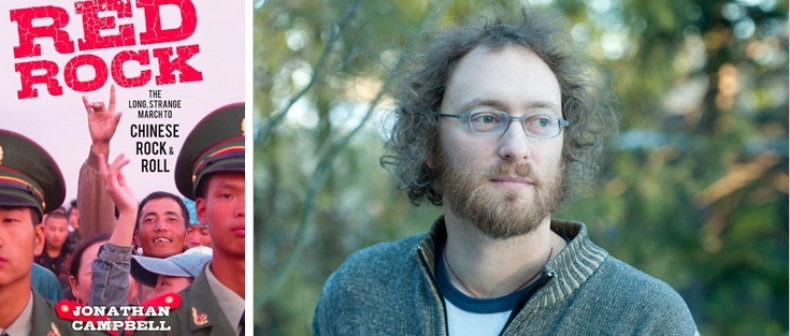
Rock and roll music has traversed the globe, but nowhere has it had more of a societal impact than in China.
In his book, Red Rock: The Long, Strange March of Chinese Rock, Torontonian and former Beijing resident, Jonathan Campbell explores the history of Chinese rock, from the tumultuous Mao years to present day China.
We talked to Campbell about the emergence and development of Chinese rock and his own experiences living in the Beijing rock scene.
What inspired you to write a book about the history of Chinese rock music?
I had lived among those in the Beijing rock scene for many years, discovering it within a week or so of my arrival there in 2000. I was there to study Chinese, but I learned more by playing and watching music with people than anything in the classroom. Because I played in bands and wrote about it for the local and international media, it was a pretty natural thing for me to write this book.
What surprised me was that my initial vision for the book – a focus on the decade I’d been living there, which I’d imagined to be the pinnacle of Chinese rock history – only showed how little I actually knew. I quickly realized that the real story was the way in which a scene emerged from the vacuum of the post-Mao years, echoing the country’s own experience dealing or engaging with the rest of the world, and found its way through the pre-internet period.
The short answer to what inspired me to write is the realization that rock and roll changed peoples’ lives in China, though this realization only came as I had begun to research and write the book.
China’s rock scene developed in the late 1970s. How did it come about and what was the music scene like in China at the time?
It was only after Mao Zedong died and the nation started to recover from the chaos and destruction of his reign that it was possible for Chinese people to have an idea of what lay outside of their borders. Travel was virtually impossible, imports were verboten and only a very few number of outsiders made their way into China. In that era, when students whose universities had been shut down could go abroad to study and some lucky citizens could go abroad to work, a small number of these Chinese met the sliver of journalists, diplomats, students and rare businesspeople now allowed into the country and they got to hear what the world sounded like. Simon and Garfunkel, the Carpenters, John Denver and a Taiwanese popstress (Teresa Teng) were among the first artists that attracted Chinese to the path that would lead them, eventually, to rock and roll.
Kids attracted to the music would exchange and listen to tapes with a fervour that seemed to be religious, and that was the result of the world in which they were living. They saw, in the music they heard and the books they read – there was a lot of academic and intellectual interest in rock in the early years – an alternative to the world around them.
Cui Jian helped to change the face of Chinese music. Can you talk about his influence on the scene and in particular, the significance of his song “Nothing to my Name”?
Cui was a trumpet player in the Beijing Symphony Orchestra when he first heard pop music. He started singing pop songs and became quite well known as a pop singer, which is how he was able to unveil the song that birthed yaogun (the Chinese word for rock), “Nothing to my Name.” In 1986, he was one of the Hundred Stars that were singing China’s entry into the “We Are the World” category of songs-for-a-cause at the International Year of Peace concert. At that concert, he was granted a chance to perform a song of his own. He changed out of the pop star uniform and had a live band playing with him, which in and of itself was shocking. To those of us living in the West, his performance looked normal; to the Chinese watching in 1986, it was like nothing they’d seen, or heard, before. The cool thing about yaogun is it has a birthdate: It’s the day that Cui sang “Nothing to My Name,” May 9, 1986.
He says that “Nothing to My Name” is a love song, but to so many of his generation it was far more than that. “I ask you endlessly/When will you go with me/But you only laugh at me, saying/I have nothing to my name”: Yes, it could be a classic boy-wants-girl, but it came to represent the angst that was in the air at the time. It was different from everything else. Three years later when he called his album Rock and Roll on the New Long March, people knew that it was called yaogun, rock and roll.
Is rock music still as popular today in China as it was in 1980s?
These days, unlike the 80s, the word yaogun is a word that most urban residents would have heard before. There are clubs where rock can be performed regularly in many cities across the country. You even see rock in the imagery of advertising. So it’s popular, but in a different way. It’s certainly not fully accepted by the powers that be, but the yaogun population is small enough to not be seen as a threat. It is still a difficult thing for contemporary Chinese society to process the idea of a kid joining a band rather than getting a job. But then, that’s not an altogether different situation from here.
What’s one of your favourite Chinese rock song’s and why?
“Nothing to My Name” took on new meaning to me when I re-examined it in the context of China’s and yaogun’s history. It was so important in so many ways, but it’s hard for people to appreciate that without a full understanding of the context it came out of. I know that truly good music is supposed to work without context, but, well, this is China, and it’s not just a different world. It’s outer space. Also, I love just about everything that Lonely China Day has ever done, particularly “Rise Up.” LCD sounds like contemporary China to me in a way that’s hard to describe. Subs, who I took to Europe on tour a couple of times, have a great song called “Down,” which is a reaction to the singer being told by her father that her choice to play rock music left her with ‘Four Nos’: No money, no job, no family, no future. If ‘up’ is where society tells her to go, she says, she chooses down.
Jonathan Campbell will be giving a talk about his book “Red Rock: The Long, Strange March of Chinese Rock and Roll” at the Toronto Reference library’s Beeton Auditorium (789 Yonge Street) on Tuesday, February 14th at 2 p.m.
____
SÃle Cleary is a regular contributor to Toronto Standard. Follow her on Twitter at @silecleary.
For more, follow us on Twitter at @torontostandard, and subscribe to our newsletter.














